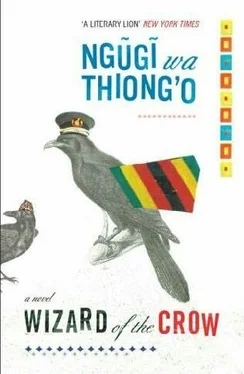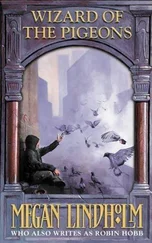Big Ben Mambo, who had always fancied himself a military man, saw an excellent chance to enact his fantasies. Instead of speaking from the platform, Big Ben elected to stand atop one of the armored vehicles, prefacing his official message with a statement that he was speaking on behalf of the commander in chief of the armed forces of the Aburlrian State.
There would be a commission of inquiry into the facts and circumstances surrounding the disappearance of Machokali, our beloved Minister for Foreign Affairs, he now pronounced, hinting that the Ruler was even thinking of asking for help from Scotland Yard, London, and the FBI of Washington to show that he and his government had nothing to hide concerning the late minister. As soon as he said the word late Big Ben Mambo realized his faux pas, but he decided not to correct himself so as not to draw further attention to it. He proceeded.
People could not believe their ears: how could the Ruler suspend a minister who for many years had been his right-hand man? They whistled in disbelief when they heard that the police had raided the offices of the Minister of State and collected all his files for further investigation, and that Minister Sikiokuu himself had been arrested and was now being held to account for the disappearance of Machokali. Mambo alluded to the long-standing rivalry between Machokali and Sikiokuu, going all the way back to the days when Machokali chose London for the surgical enlargement of his eyes and Sikiokuu, Paris for the surgical enlargement of his ears. Speaking off the cuff, Mambo said that these two were fighting proxy wars for the British and the French. It was a well-known fact that these two nations, England and France, had always fought for the dominance of Europe, dating all the way back to the days of Napoleon and Nelson. That was why he, Mambo, had refused to follow in their misguided footsteps and gone to Germany for an adjustment of his tongue, which he was now putting to good use as the voice of the commander in chief. Mambo now returned to his prepared text, insinuating that Sikiokuu was involved in a dangerous cabal spreading doubts about the government. But why? Actions spoke louder than words.
Among the items seized from the minister’s offices was a suit that was more or less a replica of those worn only by the Ruler, complete with lion-skin patches, reserved by law for only the Ruler. Sikiokuu had even copied the seat on which the Ruler sat when chairing cabinet sessions. Big Ben Mambo, however, urged the people not to draw any conclusions before the commission of inquiry had completed its work.
But this did not mean that people would have to keep their mouths shut, and anybody who had any information about the disappearance of the beloved son of the soil or about Sikiokuu’s religious sect would be given a chance to present oral or written evidence to the government commission.
And now, speaking in the name of the commander in chief of the Aburlrian Armed Forces, he was ordering all the armored cars off the streets. He was also asking the crowd to disperse peacefully now that the government had responded to their main concerns.
But even as the armored cars retreated to side streets, people did not scatter; they intensified their singing and prayers, now and then shouting: We want our voice back.
The two main pillars on which his rule depended, the armed forces and the West, had loosened considerably. The Ruler had to find a way of shoring them up, and he would do so by showing both that his hold on power was not entirely dependent on them. And what better way of showing this than dispersing the defiant crowd without the aid of a reluctant military? But what other than the military and the police could he use to effect it?
The Ruler knew that he could no longer rely on any of his cabinet ministers. He had received reports that some ministers, like military officers, perhaps taking their lead from the disgraced Sikiokuu, had recently been seen cozying up to Western embassies. Gemstone’s remarks that he knew fairly well what was going on in the cabinet made him suspect that some of his ministers were paid informants. To frustrate these informants, he had decided not to hold cabinet meetings. Now that Machokali and Sikiokuu were no longer around, the Ruler realized how much he had depended on them in times of crisis. Not that he missed them, for he had replaced them with Tajirika and Kaniürü, who could be trusted to say what he wanted to hear. He played them time and again against each other. The Ruler would often meet with each separately. There were things that he wanted to remain between Kaniürü and himself, and others that he wished to share only with Tajirika. He also knew that they were crooks. Although they hated each other, he knew that he had to forestall the possibility of a conspiracy between them against him. My special advisers, he fondly called them, and it was to them that he now turned for help in finding the most appropriate means of dispersing the crowd. First up was Kaniürü.
Kaniürü came up with two proposals. If for some reason the Ruler did not want to deploy the armed forces, then he should play deaf to all pleas of restraint from foreign countries and give Kaniürü’s boys the license to trash the arrogant gathering as a lesson. Alternatively, efforts should be intensified to recapture the Wizard of the Crow, who should be compelled under threats of torture and death to use his powers to cure the maddening crowd of its queuing mania and cleanse it of all impure thoughts. He, Kaniürü, had already set snares for the wizard, and although they had yet to catch the quarry, he was positive that the Wizard of the Crow and the Limping Witch would not evade Kaniürü’s nose for long, he added, and laughed.
Tajirika, too, advised enlisting the services of the Wizard of the Crow but stressed the unlimited manufacture of Burl money, which would be divided into two piles.
The first lot would go to buying foreign currencies to be stashed in Swiss banks, adding to what was already there. The Ruler could also use the money to buy properties in tax havens abroad. As governor of the Central Bank, Tajirika would of course ensure that the new money got into circulation without a hitch; even so, he argued for the creation of new banks, Mwathirika Ltd.
The other pile would be used to disperse the crowd in the most effective, public, and peaceful manner possible. The Ruler would simply announce a day when money would fall on the waiting crowd like manna from Heaven. At an appointed time, four helicopters would drop Burl notes starting in the center of the crowd and fanning to the east, west, north, and south. The scramble would scatter the dissidents to the four winds.
The setting up of money-laundering banks sounded like a stroke of genius, and the Ruler could not help thinking that if the Wizard of the Crow were forced to reveal the secret of dollars growing on trees, this windfall income could also be put into national and international circulation easily, along the paths already tested with the Burl. The idea of Mwathirika banks was so appealing that the Ruler insisted that Vinjinia, Tajirika’s wife, become its nominal founder and managing director and the Ruler’s sons, its board of directors. Tajirika’s other suggestion was equally brilliant, achieving the desired result without recourse to bloodshed.
A crook after my own heart, the Ruler muttered to himself, mesmerized by the simple beauty of Tajirika’s plan, and he was glad that he had appointed him governor.
“And Titus,” said the Ruler suddenly, as if rewarding him for the clarity of his plan. “There is a chair and some clothes that I understand were taken from Sikiokuu’s offices. You now see the kind of ministers with whom I had surrounded myself? Appointing themselves heirs to my seat? I don’t trust-I mean, keep this evidence of treachery under lock and key for me until I decide what to do with Sikiokuu and his coconspirators.”
Читать дальше












